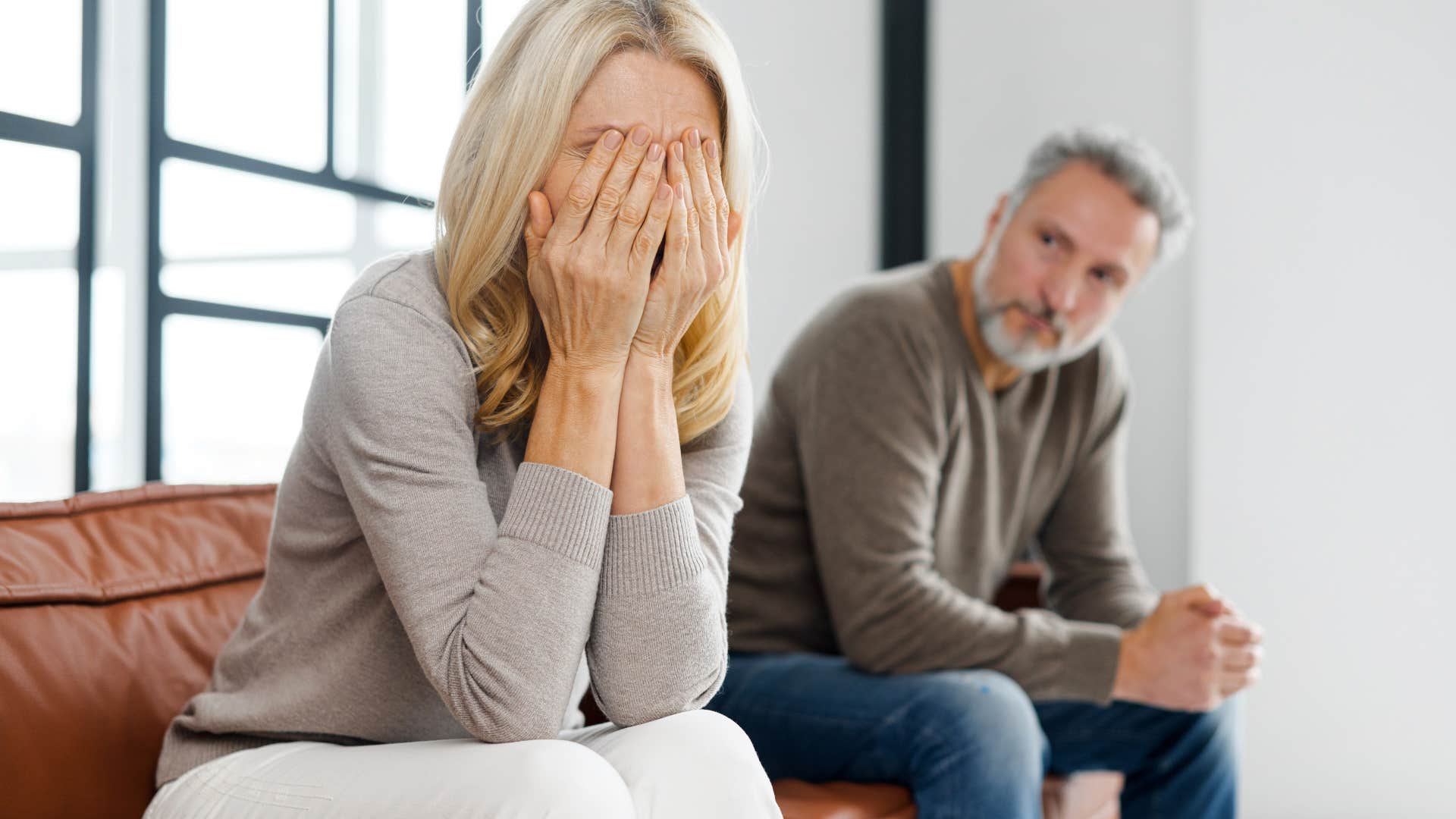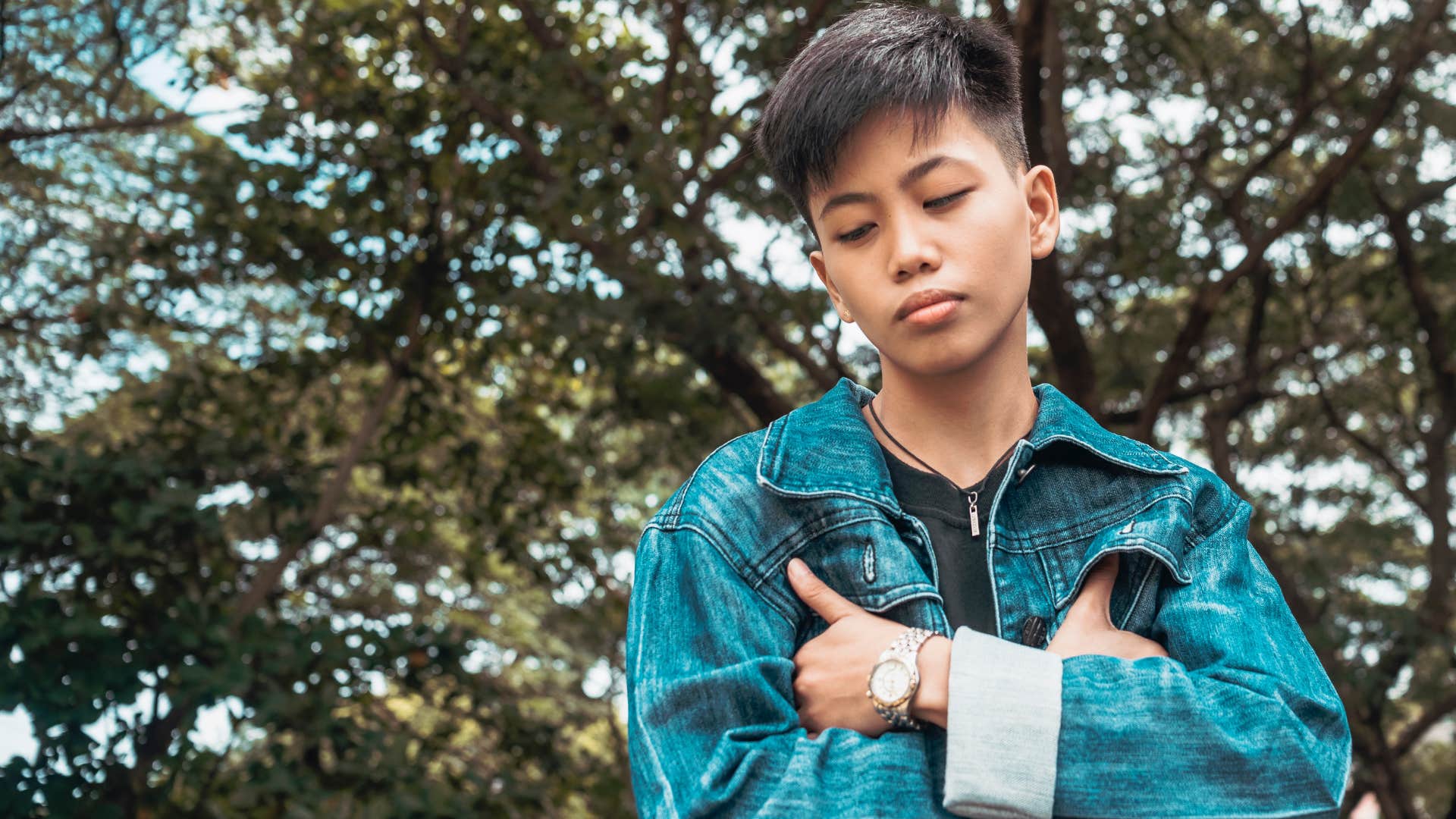According to experts from the therapy organization “A Space Between,” ungrateful people are often motivated by an inherent sense of entitlement in their lives. From relationships, to working spaces, and passing interactions, they overlook the empathy and energy other people invest into them under the assumption that they’re “worthy” solely because of their existence or perceived worth.
There’s several phrases ungrateful people say often, according to psychology, in their relationships that exemplify this entitlement and can be “red flags” for people on the receiving end of their disconnected mindset. By acknowledging their gaslighting, their partners, friends, parents and peers can set healthy boundaries, protecting their emotional health and generosity from being taken advantage of.
Here are 11 phrases ungrateful people say often, according to psychology
1. ‘You owe me’
 Kateryna Onyshchuk | Shutterstock.com
Kateryna Onyshchuk | Shutterstock.com
A study from the journal Personality and Social Psychology argues that ungrateful people tend to hyperfocus on what’s “missing” from their lives, rather than what they already have, whether that be a healthy relationship, support, or financial stability. This inherent dissatisfaction can cultivate a toxic foundation for relationships, where an ungrateful partner is always setting impossible expectations for their equal.
By missing out on opportunities to empathize, thank, and express gratitude to their partner, they also miss out on evolving in their relationships — including growing trust, intimacy, and a sense of unconditional loyalty without entitlement. Partners of ungrateful people can develop people-pleasing tendencies in response to this behavior, where they feel obligated to protect and support their partner out of necessity, rather than free will.
2. ‘Just remember, I was there when you had nobody’
 People Images Yuri A | Shutterstock.com
People Images Yuri A | Shutterstock.com
Ungrateful people don’t embody true loyalty in their relationships; instead, they urge their partners to “work for” their conditional loyalty with phrases like this. Their kindness, misguided empathy, and compassion only feeds into their transactional view of relationships, giving them toxic leverage for demands down the road.
Their ungrateful tendencies also feed into manipulation tactics and emotional abuse, as they attempt to isolate their partners from their friends, family, and inner circles to wield more control over their everyday lives. By suggesting they were there when their partner “had nobody,” they can manipulate their partner’s emotions and experiences to best suit their agenda and needs.
3. ‘I forgot I only exist when you need something’
 Face Stock | Shutterstock.com
Face Stock | Shutterstock.com
According to a study from American Psychologist, individuals who practice gratitude in their daily lives and relationships tend to experience less negative emotions than their ungrateful counterparts. When partners and individuals are not prioritizing gratitude in their lives, they tend to experience inner turmoil filled with uncomfortable emotions like guilt, shame, and entitlement.
Burdening their partners with these emotions is how many ungrateful people find relief, re-assigning their guilt to their partners for not being 100% available to support or listen to them. As this cycle of intense emotion and manipulation continues, it only becomes harder for both an ungrateful person and the people in their life to refocus on the positive elements of their relationship.
4. ‘Loyalty is a privilege, not a right’
 Dikushin Dmitry | Shutterstock.com
Dikushin Dmitry | Shutterstock.com
Ungrateful people cultivate transactional relationships in every part of their lives, bestowing conditional love, admiration, and loyalty in their connections that sparks resentment in everyone involved.
When they don’t get what they want or a partner refuses to toxically sacrifice their well-being for the sake of a relationship, they’ll use phrases like this to emotionally blackmail others, self-sabotaging their connections by sparking a sense of obligation and guilt.
5. ‘Nobody ever thanks me when I do things for them’
 Prostock-studio | Shutterstock.com
Prostock-studio | Shutterstock.com
A 2023 study on gratitude suggests that children who grow up with caregivers and parents who prioritize gratitude in their lives often have better social relationships and a more balanced emotional health than their ungrateful peers. While it’s largely recognized that our parent’s model behavior influences our well-being in adulthood, this practical example showcases the tendency for transactional relationships to follow adult children into their own connections.
If a parent expects gratitude in response to every parenting action — from picking you up, to putting a “roof over your head,” or buying groceries — their adult children likely carry this mindset into their romantic relationships, with behaviors and actions that are simply the hallmarks of a loving connection like open communication or honesty.
They gaslight their partners into believing they’re only “worthy” of loyalty, honesty, or love when they’re actively addressing and expressing gratitude for it, instead of letting it manifest from the nature of unconditional love.
6. ‘You don’t deserve that’
 shift drive | Shutterstock.com
shift drive | Shutterstock.com
As one of the phrases ungrateful people say often, according to psychology experts, this one tends to manifest in response to a person’s emotional needs and communication.
An ungrateful partner will almost always dismiss emotional needs when they’re not self-serving or comfortable, cultivating a hostile space for the open communication needed to sustain a healthy relationship. To them, a person is only “deserving” of the basic tenets of a healthy relationship when their ungrateful partner is comfortable, happy, and supported.
7. ‘Why do you always make me feel like this?’
 Prostock-studio | Shutterstock.com
Prostock-studio | Shutterstock.com
Ungrateful people often refuse to take responsibility for their own actions, expecting other people to sacrifice their own emotional well-being to support them in every way. They’re ungrateful for the things their partner, friends, and family already do, even if they’re not reciprocating the same behaviors.
As a 2019 study on blame-shifting revealed, most ungrateful people rely on this practice to “save face” when they’re confronted with the consequences of their own actions (or rather, inaction). By bringing attention to external factors, like their partner’s behavior or habits, they can victimize themselves to further manipulate the people in their lives.
8. ‘Why am I always unhappy?’
 Dragana Gordic | Shutterstock.com
Dragana Gordic | Shutterstock.com
Research presented by Harvard Health Publishing revealed that people who express gratitude more often in their lives are generally more happy than their counterparts. Ungrateful people often feel chronically unfulfilled, from their own personal development to their relationships, because they struggle to express thanks to other people in their lives.
In addition to the manipulation they constantly rely on and the transactional nature of their relationships, their interactions are often guided by the anxiety and expectations they misguidedly burden themselves with.
9. ‘I wish I could afford that, but I can’t’
 MDV Edwards | Shutterstock.com
MDV Edwards | Shutterstock.com
Sometimes, ungrateful people are far less direct when they’re expressing disguised requests to the people in their life. By playing the victim and shifting guilt to others, they can ask — without literally asking — for what they need, whether it be emotional support or money.
Of course, if you have healthy connections, partners, family, and friends in your life, they’re going to respond to you playing the victim. They don’t want to see you hurting or at risk, so they’ll sacrifice their own well-being or boundaries to help.
10. ‘I didn’t ask you to do that for me’
 Ground Picture | Shutterstock.com
Ground Picture | Shutterstock.com
Ungrateful people rely on phrases like this because they know they’ll never actually “ask” people to do things for them. Open communication, emotional support, and loyalty are hallmarks of a healthy relationship.
So, if your partner is trying to justify their own actions and mistakes or shifts blame by relying on this phrase, remember: that says more about their perception of a healthy relationship than your actions.
11. ‘You’re being unfair’
 EugeneEdge | Shutterstock.com
EugeneEdge | Shutterstock.com
Many ungrateful people dismiss uncomfortable emotions like guilt by shifting blame onto the other people in their lives. By suggesting it’s always everyone else in the wrong and victimizing themselves, they can manipulate others into overstepping their boundaries.
While it might seem “unfair” to ungrateful people who have unrealistically high expectations for the people in their lives, people who re-assert their boundaries can protect their energy in these conversations and relationships.
Zayda Slabbekoorn is a news and entertainment writer at YourTango who focuses on health and wellness, social policy, and human interest stories.

